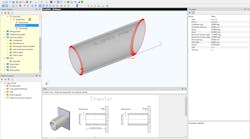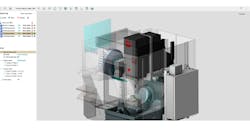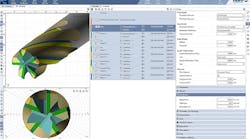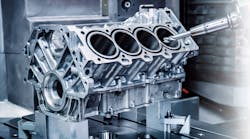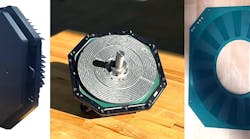Vero Software’s VISI product suite is an integrated CAD/CAM program that MNB Moulds uses for mold and tool design and manufacturing.
The JUGIT milk dispenser, seen here in its finished form.
The four-impression spike tool that MNB Moulds designed for manufacturing the redesigned JUGIT milk dispenser
The 2D plate, produced with machining automated using Vero Software’s Compass Technology
MNB Moulds is a British manufacturer of multi-cavity, high-accuracy hardened steel tools for the automotive, medical, and electrical markets. Established in 1974, MNB produce 50-70 molds per year for high-visibility customers that include Eaton Corp., Honeywell, MK Electric Co., and Cable Management Group.
Frank Ryan, managing director and owner of MNB Moulds since 2000, is a conscientious investor in new machinery and CAD/CAM technology: his company has been using the Vero Software’s VISI product suite since 2002.
"We have been using the software extensively for 3D tool design and complex machining,” Ryan explained. “However, when machining bolster plates, 2D design information was being passed to the CNC machines for MDI input. This process was labor intensive and open to manual operator error.”
Ryan continued: "I have visited a number of toolrooms across Europe, especially in Germany, where my eyes were opened to what is possible through the use of specialized technology. My goal was to make the company more productive, so we invited Vero to study our manufacturing processes to see how they could help.”
The consultation led to several internal reviews to help MBN understand better the process bottlenecks, operator skill levels, and other details of its organization that need to be addressed. Then, a plan was put in place to reassess the tooling requirements, fully train the shop’s operators for the latest software developments, and to move toward fully automated 2D machining using Vero's Compass Technology.
Compass is a CAD/CAM/Analysis for software suite used by toolmakers and machinists to program their work. It presents a standard, simplified program with all functions fully defined and accessible, for fast execution and efficient product flow. VISI emphasizes that it is also exceptionally accurate and cost-effective.
“We have had tremendous success with improving our quality and efficiency over the years, with a particularly significant step in productivity in the last twelve months,” Ryan confirmed. “This is in large part down to the investment we have made in automating our 2D machining and standardizing on an integrated CAD/CAM solution."
He continued: "We were already a happy Vero customer, but we recognized that some of our manufacturing processes could be improved to maximize our productivity. Not only did we implement additional software, we also moved onto a network license to provide extra flexibility within the toolroom. Now that everyone has access to the data, the designers and machinists together can develop a clear plan as to how the tooling would best be manufactured. This includes incorporating multiple inserts in to one block that can be rough milled, hardened, ground, and wire cut into individual parts – unattended."
The advantages of the software consolidation is easy to recognize in a recent project, involving a mold for manufacturing an environmentally friendly milk dispenser. With individual consumers and consumer products companies now focusing their attention on ways to reduce packaging waste, milk cartons are an item that is easily identified for a design improvement.
Britons consume 9.3 billion pints of milk annually - and only one out of every four plastic milk bottles are ever recycled. The remaining three out of four cartons are landfilled. The JUGIT product was developed to attract milk-buyers who are concerned about their individual environmental impact. It is a PET plastic carton of milk that can be saved and refilled by subsequent purchases of milk packed in lighter-weight, low-density polyethylene bags. Consumers buy one jug, then bags of milk to refill the unit. This concept was new to Britain, but has been in use elsewhere and is reportedly a common choice for milk buyers in Canada, Poland, South Africa, and China.
Prior to the rollout in British supermarkets, however, a design change was sought in reaction to consumers’ practical experiences. The initial design called for the consumer to hold a corner of the bag to ensure its correct placement before inserting a detachable spike attachment to puncture the bag. In the new design, the bag is secured with an integral clip and the spike is part of the lid, automatically perforating the bag upon closure.
MNB Moulds has manufactured tooling for a number of components, including a two-impression tool for the handle, a two-impression tool for the lid, a four-impression tool for the spout spike and an eight-impression tool for the clamping mechanism.
Describing the four-impression spike tool, Ryan explained: "The complete tool was designed, cut and built within a 1,000 hour window. The implementation of the Compass Technology has resulted in a 20% increase in our machining productivity and reduced the need for detailed tool drawings as setup sheets are generated automatically for all toolpaths. Just for this single tool we have saved approximately 60 hours of machining time alone. If we roll out these productivity improvements throughout a typical year (10,000 machining hours), I would expect to save in excess of ≤60,000 ($95,000) per annum."
Vero Software breaks out the production time for complete spike tool project this way: 160 hours for design, 300 hours for CNC milling (bolster, cavities and electrodes), 250 hours for grinding, 150 hours for spark erosion, 60 hours for wire EDM, and 280 hours on the bench.
"Moving to an entirely integrated solution has had a very important impact on our business as well as better synergy across personnel,” Ryan concluded. “The improvements in 2D machining have also saved the cost of one of the turret mill operators who recently retired and whose work has been absorbed within the CNC milling section with the additional capacity created. Vero continually develop products that cover the design and manufacturing needs of a toolroom like mine and have firmly established themselves as an integral part of our future."






